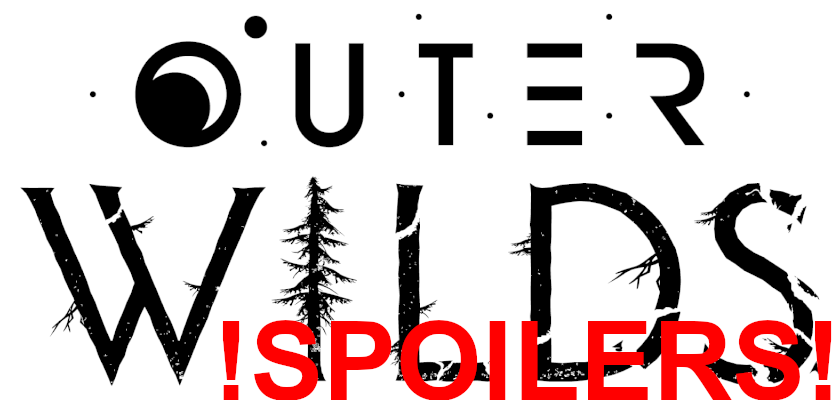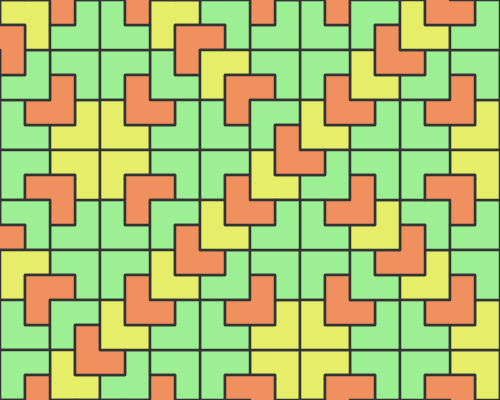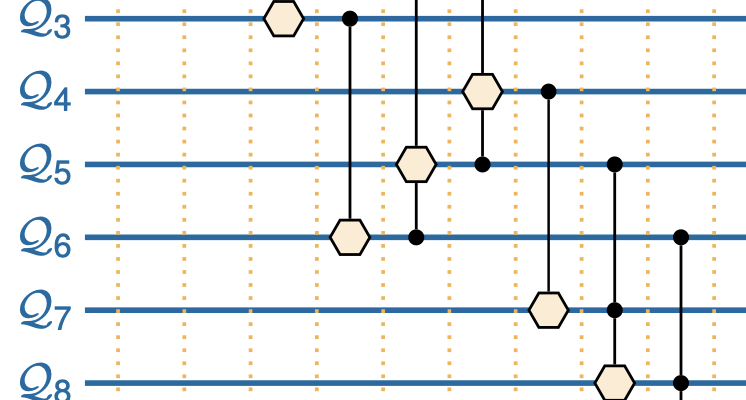Everyone loves the Townscaper grid. It’s got a a nice organic look, while still being quadrilateral tiles, somewhat regular, and reasonably easy to implement. But it has some annoyances. I’ve finally managed to find my own design of grid that has a very similar look, but fixes these problems.
Continue readinggamedev
Outer Wilds Mission Graph
I recently played Outer Wilds and absolutely loved it. But after playing it I realised how little of the game was really on the critical path – most locations fill in lore and deepen your curiosity but don’t actually help you reach any location you couldn’t before. To analyse this, I made a mission graph for the game. Spoilers ahead.
SPOILERS IN FULL ARTICLEWraparound Hex Grids
A user requested adding wrapping hex grids to Sylves. That is, a grid that is a collection of hexagons, and the collection itself is also hexagonal shaped. When you exit from one side, you re-enter on the opposite side.
The maths for this turned out to be surprisingly fiddly, and not listed by RedBlobGames, so I thought I’d share it here.
Continue readingGenerating Tilesets with Stable Diffusion
Recently I’ve been playing around more with gen AI techniques. I thought I’d try to generate a set of tiles that all connect together. It’s harder than it sounds – Stable Diffusion is hard to control, so there’s no easy way to get a set of images that are fully consistent with one another.
I’ve developed a technique for doing it that I’ll call Non-Manifold Diffusion as it involves doing diffusion over a set of patches that interlock to form a non-manifold surface.
Continue readingSubstitution Tilings
I’ve been working on adding aperiodic grids to Sylves.
Aperiodic tilings are made tilings are made of a fixed set of tiles, rotated and translated to fully cover the plane.But they are not periodic – there’s no way to rotate/translate the whole grid onto itself.
This makes them almost hypnotic in their balance of regularity and chaos. A classic example is the penrose tiling.
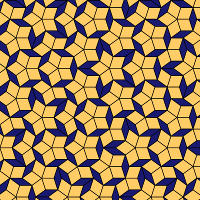
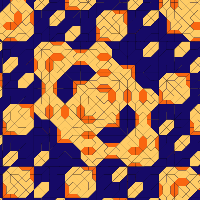
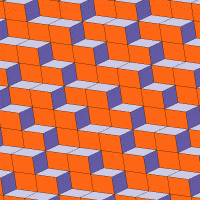
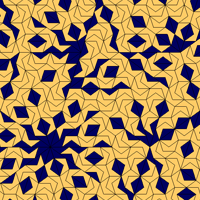
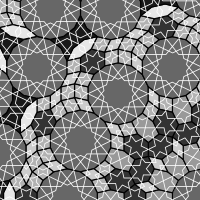
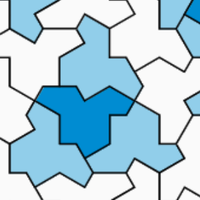
Quantum WaveFunctionCollapse
One of my biggest gripes with the WaveFunctionCollapse procedural generation algorithm is that, despite the name, it doesn’t really have anything to do with quantum mechanics. I usually prefer the term Constraint Based Procedural Generation instead.
The name WaveFunctionCollapse is meant more as an analogy. As the algorithm progresses, it resolves a fuzzy, uncertain picture of the output into sharper detail, much as in quantum mechanics, the state of a system is also a range of possibilities, which resolves to something specific when “observed”.
But could we adapt WFC to the Quantum way of thinking, and ran it on actual Quantum Hardware? Well, that’s exactly what is discussed in this new paper Quantum WaveFunctionCollapse by Raoul Heese1 (Youtube summary). Does it work? Is it fast? Let’s find out.
Continue readingInfinite Uniform Point Distributions
Rune’s recent talk on layered procedural generation has got me thinking about procedural generation again, so I wanted to share a technique I found about doing a uniform distribution of points on an infinite plane. I assumed this would be a well known thing, but I couldn’t find any references elsewhere.
Continue readingRuleBook
I’m releasing a new open source library, RuleBook. Inspired by Inform 7‘s rulebook feature, it’s a way to make functions by defining a set of rules to evaluate. RuleBooks let you define functions are easy to mod and update at runtime.
What are rulebooks?
Rulebooks are essentially a fancy form of C#’s Func<> and Action<> generics.
Func<> and Action<> can hold a reference to a C# method, or an lambda expression/statement. But the thing they hold is essentially a black box – you cannot do much with it except run it, or check equality.
RuleBook provies FuncBook<> and ActionBook<>, which work similarly to their counterparts. But these rulebook objects are built out of individual rules, which can be individually inspected and mutated.
Overall, rulebooks give a systematic way of handling a bunch of useful programming patterns, including events, multiple dispatch, modding and code weaving.
Rulebooks are not an elaborate rules evaluation engine, it’s a lightweight way of stitching together bits of functionality.
PuzzleScript Rules
I was watching ThinkyCon, a conference on making puzzle games, and many designers mentioned that they use PuzzleScript to prototype their ideas. PuzzleScript is a puzzle design environment created by increpare, the designer behind Stephen’s Sausage Roll and many other puzzle games.
PuzzleScript is a marvel of economic design. A single text file specifies, all the graphics, levels, sound effects, and all the rules of the puzzle. It uses a custom system to concisely express rules. So concise that the rules of Sokoban can be expressed in a single line.
This efficiency comes because rules are expressed as find-replace rules. That makes it a grammar replacement system, which I last discussed when looking at Ludoscope and Unexplored. But it has many pragmatic features geared toward puzzle design, which I’ll explore in this article.
Continue readingWhat Is Procedural Generation
Procedural Generation can be interpreted quite broadly as just “making computers make cool creative things”. People make art, games, music, audio, stories and all sorts of weird things.
I’ve been doing it as a hobbyist for some time, and have become more and more involved: I make tutorials, projects, I sell a tool online for a niche algorithm, and recently taught a “masterclass” at Everything Procedural, the main conference for professionals in the space.
I thought I’d spill some digital ink about what it’s actually about. I get asked often enough, and this will help me clarify my verbal answers.
Continue reading
